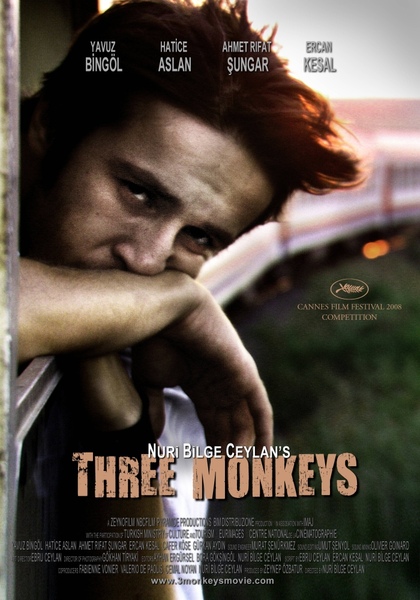Origin: http://blog.yam.com/modernhippie/article/18312530 by Modern Hippie
十月趕在金馬影展之前,有部獲得2008坎城最佳導演獎的土耳其的電影《三隻猴子》(Three Monkeys)搶先全球在台灣上映了。這片故事大意是一個三人家庭,因為司機老爸為了正在選舉的老闆頂罪去坐牢,以換得優渥的生活,妻子卻在他頂罪坐牢期間搞上了老闆,兒子看不慣老闆玩弄自己的媽媽所以殺了老闆,司機老爸為了兒子前途只好再找人替罪坐牢,這樣因為人性道德爭扎而似乎無止盡的循環,「僅僅四個簡單的角色,就將欺瞞、貪婪、癡迷、情慾,放縱到一種不堪收拾的局面」。
我大多看到《三隻猴子》的典故是日本的「三不猿」,意指「不聽、不看、不說」,象徵片中這三人家庭也是一昧不聽、不看、不說而逃避現實。我卻因為深受儒學教育荼毒,一時只以為那些猴子是論語中說的「非禮勿視、非禮勿聽、非禮勿言、非禮勿動」而少了一個「動」的猴子,而且我還認為,這三人其實就是被老闆搞得團團轉的猴子。
一樣是替老闆頂罪入獄的猴子,馬英九也養了一隻,名叫余文。
馬英九特別費案暴發之後,大家都在查他到底用特別費買了些什麼。後來發票查出來有捐贈給一些機構,也有大多是匯給家人或者匯給馬小九,也有去買黛安芬內衣的品項,林林總總,引發一陣討論。結果馬英九不沾鍋習慣了,乾脆跳出來大喊他要選總統以示清白,油污給其他人去沾。
像《三隻猴子》裡要選舉的老闆一樣,選戰如火如荼,這時冒出這種罪證確鑿的事情怎麼辦?影片中酒駕肇事逃跑沒被追到算幸運,但是特別費的發票有實證,該怎麼才能賴得掉呢?因為馬英九怎樣都要選總統,只好找個不用選的公務員來擔所有責任。找來找去,當然就找到負責貼發票的小公務員余文。
《三隻猴子》的老闆跟司機老爸循循善誘,甚至用「我給你工作是幫助你的恩惠,這時就是還人情的機會」來「開導」司機老爸,司機老爸只想到頂罪自首坐牢可以領補助,讓家裡可以過得更好,老闆若當選了可能出獄後還有其他機會攀升,所以就答應了,只不過人生就是常常事與願違,更何況全家三人還都被老闆當猴子耍弄。
可憐的余文頂了所有黑鍋,以為可以像馬英九裝可憐就能獲得緩起訴免坐牢的待遇,況且馬英九都已經登上總統寶座了,余文卻連申請暫緩入監,三次都歸失敗,而且還無人聞問。
余文在入獄前接受媒體採訪,他嘆說
「我沒拿公家一毛錢入口袋,法律怎會這樣對我」
「我要不是在馬英九辦公室做事,恐怕也不會落得如此下場」
「我便宜行事,是做錯了,但罪不及於一年刑期才對」
然後還是很癡情地默默祝福馬英九,走入了牢房。
這三句話就聽得出來余文還真是馬英九的乖猴子。
我想余文如果早些看到錫蘭導演拍的《三隻猴子》,或許他就不會被馬英九當猴子耍了吧。
《三隻猴子》台灣官方部落格
這是香港南華早報(SOUTH CHINA MORNING POST)在11月13日刊登馬英九恩師孔傑榮教授投書所附的圖,三個不視、不言、不聽的人民,跟馬英九現在玩弄的猴子有異曲同工之妙。
不過一想到這是映照台灣人民面對人權被剝奪的現況,看了只有難過吧。
http://twnathan.googlepages.com/Tiesthatblindlargeprint.pdf
( “Ties that Blind: Improved cross-strait relations appear to have come at a cost to some civil liberties in Taiwan” by Jerome A. Cohen, Adjunct Senior Fellow for Asia Studies From November 13, 2008 South China Morning Post )
“Ties that Blind: Improved cross-strait relations appear to have come at a cost to some civil liberties in Taiwan” by Jerome A. Cohen, Adjunct Senior Fellow for Asia Studies
November 13, 2008 South China Morning Post
Last week's historic visit to Taiwan by Beijing's cross-strait chief, Chen Yunlin , which culminated in four useful agreements, focused attention on issues of human rights as well as politics. Some issues concerned the proper government response to public protests in a free society. Others involved fair investigation of former and present government leaders suspected of corruption.
Chinese have recognised the importance of protecting foreign envoys for almost 3,000 years. The feudal states that contended for power before establishment of the Qin dynasty reciprocally assured the personal safety of their emissaries. Such protection has continued to be indispensable to inter-state co-operation.
After police in Tainan failed to prevent an assault on Mr Chen's deputy, president Ma Ying-jeou's government was obligated to do better during Mr Chen's visit. Although police could not prevent Mr Chen from being trapped in a hotel for eight hours by a huge mob of protesters, they did defend him against bodily harm throughout a stressful week.
In doing so, they went beyond the limits of a free society, forbidding peaceful protesters from displaying Taiwanese and Tibetan flags, confiscating flags from demonstrators, closing a store that played Taiwanese songs and seeking to minimise the visitors' awareness of the protests. There were also incidents of police brutality, albeit sometimes in response to violent provocations by demonstrators.
The police misconduct even outraged many local supporters of Mr Chen's visit. Mr Ma, in addition to implementing his campaign pledge to sponsor revision of the Assembly and Parade Law to eliminate protesters' need for advance official permission, should recommend amendments prohibiting the kind of undemocratic police practices that recently occurred and order training designed to enhance police compliance with the law. It is encouraging to note that Democratic Progressive Party chairwoman Tsai Ing-wen, who led the massive opposition demonstration, has subsequently called not only for a government review of police misconduct but also for a re-examination by her own party of its failures to maintain order among its demonstrators. The DPP, if it is to fulfil its essential role as democratic opposition, must not degenerate into an army of street fighters.
Some Taiwanese and foreign critics took the occasion of Mr Chen's visit to call attention to another crucial feature of democratic government - the fair prosecution of current and former officials suspected of corruption. The critics voiced three serious complaints about recent arrests and incommunicado detentions of prominent DPP figures who have served as government officials. They imply that the DPP is being singled out for prosecutions while corruption among Kuomintang leaders is being ignored. They also claim that: most DPP suspects have been held incommunicado without a court examination of the justification for their detentions; and that prosecutors' offices have been leaking detrimental information about the suspects to the media while denying them knowledge of the leaks and a chance to refute the "trial by press".
These practices, it is said, bring into question the political neutrality of the judiciary, and the presumption of innocence and other elements of due process required for the fair and open trials essential to democracy, raising the specter of the unjust procedures of "the dark days of martial law" (1947-1987). It is not clear whether critics' claims of "selective prosecution" are well founded. Recent arrests may simply reflect massive corruption by the DPP, which dominated executive government for the past eight years - corruption that allegedly reached as high as former president Chen Shui-bian and his family.
Oddly, although during the Chen administration some prosecutions were brought against both DPP and KMT figures, some obvious KMT targets were overlooked despite reportedly thick dossiers compiled by Control Yuan investigators. Mr Ma should appoint a commission of impartial experts to review such prosecutions.
It does not appear that any of the recently detained DPP figures were denied a court hearing or their right to counsel. Moreover, there is a legislative basis for the courts' decisions to detain them incommunicado for up to four months of investigation if there is a reasonable basis for believing that the suspects might otherwise falsify evidence. Yet, in view of the harshness of this pre-indictment sanction and the obstacles it creates to mounting an adequate defence, it ought to be invoked rarely.
Certainly, the Legislative Yuan, or the commission suggested here, should re-examine legislation to strike a new balance between the threat of corruption to a democratic government and the threat of incommunicado detention to civil liberty.
The charge of biased prosecution leaks to the press seems to be the most straightforward of the critics' complaints. Such leaks, which occur in many countries, do appear to have taken place and cannot be allowed in a democratic system.
Jerome A. Cohen is co-director of NYU's US-Asia Law Institute and adjunct senior fellow at the Council on Foreign Relations
http://www.wehealth.com.tw/1994
迷失的聯繫:改善兩岸關係顯然已犧牲台灣的公民自由 ■孔傑榮投書(雲程譯)
上週,北京的兩岸首腦陳雲林至台灣進行歷史性訪問,並簽署四項實用性協議,輿論焦點集中於人權與政治等議題。部份議題為自由社會中政府對抗議民眾的回應。其他議題則與前任與現任政府領袖的貪瀆疑案進行公平調查有關。
中國人承認保護來使已有近三千年的歷史。在大清帝國成立之前,相互征戰的封建國家都保證來使的安全。此等保護在國與國的合作上也是必要的。
在台南警方無法保護陳先生的副手,馬英九政府本應在陳雲林訪台期間提供更佳的保護。雖然警方無法避免陳雲林因大量抗議群眾而被困八小時,他們確實在飽受壓力的一週內保護了陳雲林的人身安全。
為此,馬政府逾越了自由社會的限制,禁止和平的抗議群眾,不准其展示台灣【譯註:其實是中華民國】與西藏的旗幟。從示威者手中沒收旗幟,勒令關閉播放台灣歌曲的商店,以使訪客感受不到抗議。有一些警察暴力,雖然有時是回應示威群眾的暴力挑釁。
警察的濫權,甚至於也被陳雲林的支持者所激怒。在競選期間宣示將支持修改集會遊行法,以廢除「事前報備制」的馬先生,應建議修法禁止近日警察所發生不民主的行為,並下令加強警察服從法律的訓練。要注意的是,民主進步黨主席蔡英文領導大規模示威遊行不僅呼籲政府應正視警察濫權,也重新檢視民進黨無法規範示威群眾。若民進黨要實踐其民主反對者的角色,不得退返為街頭戰士的政黨。
部份台灣與外國評論者將陳雲林的訪問視為另一個民主政府的重要議題,即對現任與卸任官員疑似貪瀆時能獲得公平的調查起訴。評論者指出對三個前民進黨政府官員進行嚴重逮捕、收押禁見案例。這些案例暗示了,只起訴民進黨而國民黨官員則被豁免。他們也說絕大多數民進黨的嫌疑人被收押禁見而並未經法庭審視拘留的合法性,而檢察官洩漏不利於涉嫌人的資訊給媒體,而不給他們有機會反駁「媒體審判」。
這些事件讓人質疑司法的政治中立性,讓人質疑對民主政治最重要的能有公平與公開審判的「無罪推定」前提,以及其他正當法律程序所需的要素,讓人質疑將喚醒「實施戒嚴的黑暗時期」(1947-1987)不義程序的惡魔。目前尚不清楚評論者所稱「選擇性起訴」是否真確。近日的逮捕,僅反應民進黨過去八年執政時大規模的腐敗,貪瀆的層級據說達到前總統陳水扁與其家人。
奇怪的是,雖然在陳水扁政府時期,檢察官都曾起訴民進黨與國民黨要人,一些顯著的國民黨目標即便監察院有成篇纍牘的卷案,都被忽略不辦。馬先生應該成立由公正專家所組成的委員會重新檢視這些訴案。
還不太顯著的情形是,近日拘留民進黨要人是否未接受法院庭訊,或者其受審的權利被剝奪。此外,根據法律,若嫌疑者有湮滅證據之虞,法院羈押判決的期間可長達四個月。但是,就此「起訴前的懲罰」如此粗糙,同時對【譯註:被告之】正當防禦權利所造成的障礙而言,此權力應當盡量不行使。
當然,立法院或我所建議成立的委員會,在此應重新檢視遊行的立法,以在「貪瀆對民主政府的威脅」以及「羈押禁見對公民自由的威脅」之間求取新的平衡。
對於偏私的洩漏案情給新聞界一事,似乎是評論者最理直氣壯的控訴。這種洩漏案情的事情,也在許多國家發生,確有其事卻不允許在民主國家出現。
孔傑榮,紐約大學「美國與亞洲法律學院」共同主任、「外交關係協會」資深助理學人。




 留言列表
留言列表
